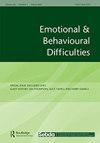Role of education settings in transition from child to adult health services for young people with ADHD
IF 1.5
Q3 PSYCHOLOGY, EDUCATIONAL
引用次数: 1
Abstract
ABSTRACT Attention-Deficit/Hyperactivity Disorder (ADHD) is a common neurodevelopmental condition. As such most schools, Further Education colleges, vocational training and Higher Education settings will need to support affected children and young people. When young people who require ongoing treatment for ADHD are around 18 years of age, they must transition from child to adult mental health services. However, only a small proportion successfully transition. As significant educational transitions are often happening at the same time, there is a need to consider how education and health service transitions may impact on one another. This paper presents findings from a large UK qualitative study involving 144 semi-structured interviews with young people who had ADHD, parents and health professionals. Two themes were identified which support the notion that education transition can impact health transition. Firstly, transition to adult health services typically requires continued prescription of ADHD medication, yet many young people stop taking their medication due to a belief that it is only needed for education-based learning. Secondly, if a young person is continuing education post-18, a lack of joined-up planning between education and health (outside of special schools) or consistent support in Higher/Further Education can leave young people with ADHD in limbo between health services and struggling within education. Given these findings, we recommend regarding multi-agency service statutory health care transition, educational staff training and ongoing oversight of child to adult health service and adult to adult health service transition effectiveness.教育环境在青少年ADHD患者从儿童健康服务向成人健康服务转变中的作用
注意缺陷/多动障碍(ADHD)是一种常见的神经发育疾病。因此,大多数学校、继续教育学院、职业培训和高等教育机构将需要支持受影响的儿童和年轻人。当需要持续治疗多动症的年轻人在18岁左右时,他们必须从儿童心理健康服务过渡到成人心理健康服务。然而,只有一小部分成功转型。由于重大的教育转型往往同时发生,因此有必要考虑教育和卫生服务转型如何相互影响。本文介绍了英国一项大型定性研究的结果,该研究涉及144个半结构化访谈,受访者包括患有多动症的年轻人、父母和健康专业人士。确定了两个主题,支持教育转型可以影响健康转型的概念。首先,向成人健康服务的过渡通常需要持续的ADHD药物处方,然而许多年轻人停止服用药物,因为他们认为这只需要基于教育的学习。其次,如果一个年轻人在18岁以后继续接受教育,在教育和健康(特殊学校之外)之间缺乏联合规划,或者在高等教育/继续教育中缺乏持续的支持,可能会使患有多动症的年轻人在卫生服务和教育之间处于两难境地。鉴于这些发现,我们建议在多机构服务的法定卫生保健过渡、教育人员培训和持续监督儿童到成人卫生保健服务和成人到成人卫生保健服务过渡的有效性。
本文章由计算机程序翻译,如有差异,请以英文原文为准。
求助全文
约1分钟内获得全文
求助全文
来源期刊

EMOTIONAL AND BEHAVIOURAL DIFFICULTIES
PSYCHOLOGY, EDUCATIONAL-
CiteScore
1.80
自引率
10.00%
发文量
10
期刊介绍:
The central intention of Emotional & Behavioural Difficulties (EBDs) is to contribute to readers" understanding of social, emotional and behavioural difficulties, and also their knowledge of appropriate ways of preventing and responding to EBDs, in terms of intervention and policy. The journal aims to cater for a wide audience, in response to the diverse nature of the professionals who work with and for children with EBDs.
 求助内容:
求助内容: 应助结果提醒方式:
应助结果提醒方式:


